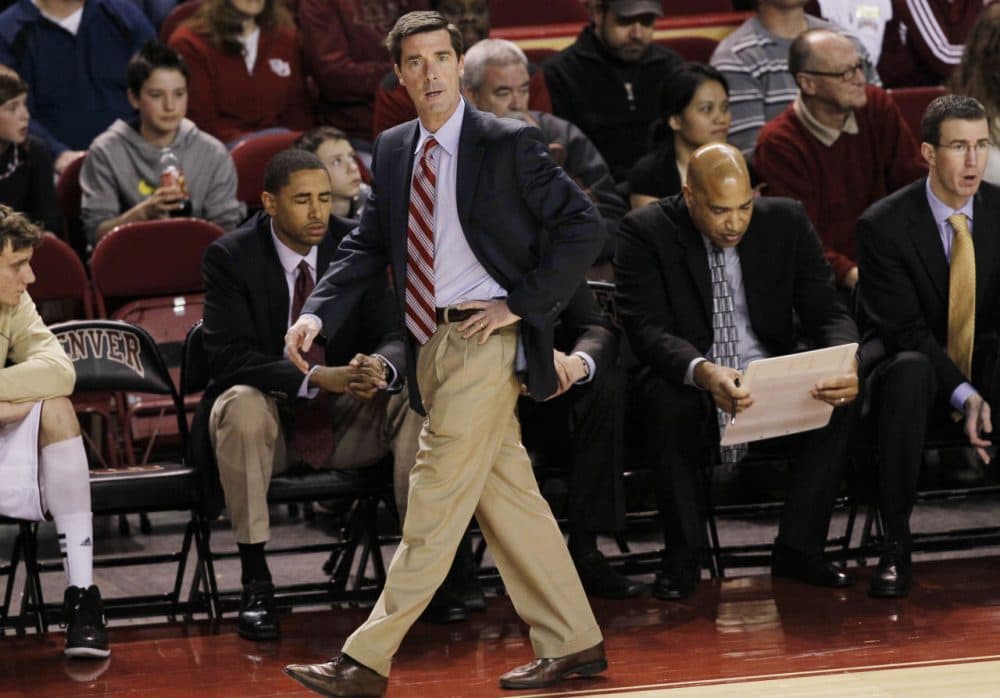Advertisement
With Shot Clock Shortened, Will Slower Offenses Struggle?
Resume
Under head coach Joe Scott, Denver University's men's basketball team has played at one of the slowest paces in the country. How will the NCAA's decision to reduce the shot clock from 35 to 30 seconds affect the Pioneers?
Scott, who learned the Princeton offense from former Tigers coach Pete Carril, joins Bill Littlefield.
BL: According to my research, your team last year was seriously deliberate. On average, you held onto the ball before shooting longer than all but two teams in the country. You were 349th out of 351 teams. What's the advantage of playing that way?
JS: Well, there's no plan to be deliberate. It's really about being efficient. It's about getting good shots. And we don't concern ourselves with, 'When are we shooting the ball?' We concern ourselves with how we play on an offensive possession. That's why, for us, we're 3-1 right now, and the shot clock hasn't affected us. I actually think the shot clock being lower has helped us.
BL: Well, tell me what you mean by that...the shot clock being lowered has helped you?
JS: What the shot clock going down has done has just made me go back to, sort of, the roots of who we're supposed to be and how we're supposed to play, and our players are playing that way right now. And I actually thought that when the rule — one, shot clocks don't score, so anybody who wants to sit there and try to increase scoring by lowering the shot clock — the most amount of points that were ever scored in college basketball was when there was a 45-second shot clock. The highest shooting percentages were when there was a 45-second shot clock. Shot clocks don't score. Players score. Ball movement scores. And player movement scores.
BL: Well, as I understand it, the reasoning behind cutting the shot clock down was to try to get more people more interested in college basketball during the regular season. It sounds to me like that might not necessarily be the case, at least as far as you interpret it.
There's a lot of other ways to make the regular season more meaningful than to lower a shot clock.
Joe Scott, Denver University coach
BL: OK, I like your idea of not having the end-of-season conference tournaments determine who makes it to March Madness. That's one way, maybe, of making people pay more attention to regular season games. What else might work? I'll give you an opportunity to consult for the NCAA...
JS: Right, well, I'd like to do that. I think that's a main one. ... We're playing Air Force, we play Wyoming. If we could play Colorado State. In the grand scheme of things, people identify with their rivals. That's when people are really zeroed in. And I think those are important now because of conference realignment and college football is going on, so if you really wanna impact the regular season in that way, I think you gotta think that way non-conference wise a little bit in terms of regional rivals.
BL: I just have one more question and this goes back to something we were talking about earlier. You played at Princeton. Do you remember having to feel like you had to make an adjustment to play there or did you just fall right into Pete Carril's system and say, yeah, this makes a whole lot of sense.
JS: You know when I went to play for Coach Carril, I played football in high school all through my life as well, and I really felt like we were playing football in terms of the interdependence. You know, football's the greatest sport of interdependency. If you don't do your job, somebody's going to get hurt. And everybody knows that, so there's sort of a real urgency to the team aspect there, and that's all Princeton basketball was. That's all Coach Carril was.
So, for me, it was very seamless. And it's very enjoyable. I think in life, everybody would agree that when you're really part of a team and that's all your concentrating on, that's when you're the happiest. In the end, when people do those things, they get really free, you know what I mean? Freedom really comes from being part of a group and not being worried about yourself. And that's the way we try to look at it and has nothing to do with the shot clock.
This segment aired on November 21, 2015.